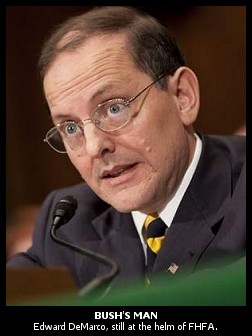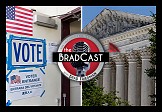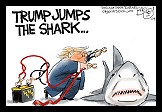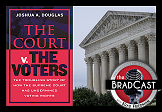 Last year, in a petition to President Barack Obama, the advocacy group Change.Org described Edward J. DeMarco, a holdover from the Bush Administration who still serves as Acting Directer of the Federal Housing Finance Agency (FHFA), as "the single largest obstacle to meaningful economic recovery."
Last year, in a petition to President Barack Obama, the advocacy group Change.Org described Edward J. DeMarco, a holdover from the Bush Administration who still serves as Acting Directer of the Federal Housing Finance Agency (FHFA), as "the single largest obstacle to meaningful economic recovery."
The FHFA controls the government-sponsored mortgage giants, Fannie Mae and Freddie Mac, which own 60% of all mortgages in the United States.
Around the time Change.Org began circulating its petition, New York Times' Nobel Prize winning economist Paul Krugman, called for President Obama to "Fire Ed DeMarco". The blog detailed how DeMarco had, in defiance of the Obama Administration, rejected a U.S. Treasury Department request "that he offer debt relief to troubled homeowners --- a request backed by an offer that the U.S. Treasury would pay up to 63 cents to the FHFA for every dollar of debt forgiven."
Treasury's request was rejected even though, as Krugman explained, "a reduction in debt burdens would strengthen the economy," creating "greater revenues" that could "offset any losses from the debt forgiveness itself."
The fact that a Bush holdover, who, for so many years, has been committed to protecting the same Wall Street casino --- the market created out of mortgaged backed securities --- whose collapse triggered what Krugman insists is now a "depression", is primarily due to the ability of Senate Republicans to block both of the nominations Obama finally made to replace him...
GOP filibuster abuse continues
Joseph Smith, whom Obama nominated to serve as the Director of the FHFA on Nov. 12, 2010, withdrew his nomination on Jan. 27, 2011 after Republicans, according to the National Council of State Housing Agencies, "prevented the nomination from coming to a vote in the full Senate" despite a 16-6 vote of approval by the U.S. Senate Banking Committee. A second nominee to the post has also been held up, so far, by Senate Republicans.
But for the GOP's ability to prevent nominations from coming to the Senate floor for an up-or-down vote, DeMarco would not have been in a position to block debt reduction in 2012.
That said, some of the blame must be shared by the President. Despite repeated occasions in which DeMarco defied his administration's policy on this core issue, no new nomination was made until May 1, 2013 when the President nominated Rep. Mel Watt (D-NC) to head the FHFA. That nomination came only after 45 members of the House, eight state Attorneys General and the advocacy group MoveOn.org joined the "Dump DeMarco" movement.
As a member of Congress, Watt had urged DeMarco to "enact principal reduction," though when his nomination came before the Senate Banking Committee, he avoided committing to a specific position on the issue, asserting a need for further study.
Last month, a temporary accord between Republican and Democratic leadership in the U.S. Senate --- struck in an effort to stave off the so-called "nuclear option" that might have done away with the filibuster --- paved the way for an up-or-down majority vote on several of the President's nominees, including Richard Cordray's long-standing nomination as Director of the new Consumer Finance Protection Bureau (CFPB). A vote on Watt's nomination to FHFA, however, was pushed back to September.
This month, with DeMarco still at the helm after all of these years, the FHFA sent a heavy-handed instruction to Fannie and Freddie, directing the two mortgage giants to "'limit, restrict or cease business activities' in any jurisdiction" that elects to use eminent domain as a debt relief tool. Moreover, Fannie and Freddie recently joined with Wall Street as parties plaintiff in seeking to have Richmond, California's unique use of eminent domain to seize underwater mortgages, restructure them and return them to home owners, declared unconstitutional.
That participation and heavy-handed directive comes during the fifth year of a housing crisis in which a number of states are still said to be "drowning in underwater mortgages." In some areas, such as Atlanta, 54% of mortgages are underwater. Those underwater mortgages and high foreclosure rates have devastated local economies and municipal solvency.
The depth and length of economic insecurity wrought by the very economic activities that DeMarco's heavy-handed directives seeks to perpetuate ought to provide the straw that finally pushes Senate Majority Leader Harry Reid (D-NV) to invoke the "nuclear option" on Watt's nomination. Until that happens, however, the GOP filibuster and DeMarco will remain what Change.Org described as "the single largest obstacle to meaningful economic recovery."
Eminent domain as debt relief tool
Cornell Law Professor Robert Hockett argues (see Bloomberg Law's discussion and video below), that while there are significant legal issues in the novel use of eminent domain being opposed by Wall Street, they are not insurmountable.
In the meantime, it doesn't seem to be legal hurdles which most concern DeMarco and his gang about this use of eminent domain.
Los Angeles Times reports that Fannie Mae Chief Executive Timothy J. Mayopoulos, whose annual executive compensation is valued in excess of $3.2 million, objects to the use of eminent domain as a debt relief tool because it "has the potential to unsettle investors in mortgage securities." The joint Fannie, Freddie, Wall Street lawsuit argues that the City of Richmond has illegally misused its eminent domain powers solely for the benefit of private homeowners.
It is a bit disconcerting to see Wall Street hiding behind "investor rights." Compare that to the April 2010 exchange between Sen. Carl Levin (D-MI), Chairman of the U.S. Senate Internal Affairs Subcommittee on Investigations and Daniel Sparks, former Mortgages Department Head at Goldman Sachs, pertaining to the fact that Goldman sold hundreds of millions of dollars in securities without advising their investors that Sparks' own staff regarded the sale as a "shitty deal."
The Wall Street lawsuit's suggestion that the only ones affected by mass foreclosures are individual homeowners reflects, at best, ideological blinders that prevent wealthy CEOs like Fannie Mae's Mayopoulos from recognizing the adverse impacts of mass foreclosures upon local economies and affected cities and counties in terms of declining tax revenues and direct costs to prevent civic blight. The "ideological blinders" descriptor is charitable. There is the prospect that Wall Street simply wants to keep its lucrative casino open for business, economy be damned.
As Hockett explains in the video below, while this particular use of eminent domain is new, the use of eminent domain to seize "intangible property" is not. The mere fact that cities and counties have had to resort to such a creative means to seek relief from the now five-year old housing crisis is but a testament to the failure at the federal level to address the source of our economic malaise --- a failure which, in turn, must be laid at the feet of the GOP and its radical misuse of the filibuster.
Bloomberg Law's recent discussion of the use of the legal issues involved in the use of eminent domain as a debt relief tool follows below...


 Sunday 'Bad Medicine' Toons
Sunday 'Bad Medicine' Toons A Friendly Suggestion:
A Friendly Suggestion: Former Fed Prosecutor: SCOTUS Corruption Ruling Less Corrupt Than Appears: 'BradCast' 6/27/24
Former Fed Prosecutor: SCOTUS Corruption Ruling Less Corrupt Than Appears: 'BradCast' 6/27/24 'Green News Report' 6/27/24
'Green News Report' 6/27/24
 Good News and Bad: At the Polls and From the Corrupted Court: 'BradCast' 6/26/24
Good News and Bad: At the Polls and From the Corrupted Court: 'BradCast' 6/26/24 'Not Something Journalists Do': A NatSec Journo on Assange Hacking, Plea Deal: 'BradCast' 6/25/24
'Not Something Journalists Do': A NatSec Journo on Assange Hacking, Plea Deal: 'BradCast' 6/25/24 'Green News Report' 6/25/24
'Green News Report' 6/25/24 Fox 'News' Grooming Viewers for Another Insurrection: 'BradCast' 6/24/24
Fox 'News' Grooming Viewers for Another Insurrection: 'BradCast' 6/24/24 Sunday 'Shark Jumping' Toons
Sunday 'Shark Jumping' Toons The Prophecy and Warning of the White Buffalo: 'BradCast' 6/20/24
The Prophecy and Warning of the White Buffalo: 'BradCast' 6/20/24 'Green News Report' 6/20/24
'Green News Report' 6/20/24 CA Biz Group, WSJ 'Fabricate' $20/hr Fast Food Wage Stats: 'BradCast' 6/19/24
CA Biz Group, WSJ 'Fabricate' $20/hr Fast Food Wage Stats: 'BradCast' 6/19/24 Interference Threats Loom Over November's Presidential Election: 'BradCast' 6/18/24
Interference Threats Loom Over November's Presidential Election: 'BradCast' 6/18/24 Inside White House Press Corps During Trump/COVID Era: 'BradCast' 6/17/24
Inside White House Press Corps During Trump/COVID Era: 'BradCast' 6/17/24 The Corrupt Anti-Abortion TX-to-SCOTUS Legal Mill Pipeline: 'BradCast' 6/13/24
The Corrupt Anti-Abortion TX-to-SCOTUS Legal Mill Pipeline: 'BradCast' 6/13/24 Hunter Conviction; Trump's Weaponized Ignorance: 'BradCast' 6/11/24
Hunter Conviction; Trump's Weaponized Ignorance: 'BradCast' 6/11/24 After Trump Verdict, GOPers Suddenly Warm to Voting for Felons: 'BradCast' 6/10/24
After Trump Verdict, GOPers Suddenly Warm to Voting for Felons: 'BradCast' 6/10/24 SCOTUS Has Been Undermining American Democracy for 50 Yrs: 'BradCast' 6/6/24
SCOTUS Has Been Undermining American Democracy for 50 Yrs: 'BradCast' 6/6/24 What Happens in Texas Does NOT Stay in Texas: 'BradCast' 6/5/24
What Happens in Texas Does NOT Stay in Texas: 'BradCast' 6/5/24
 VA GOP VOTER REG FRAUDSTER OFF HOOK
VA GOP VOTER REG FRAUDSTER OFF HOOK Criminal GOP Voter Registration Fraud Probe Expanding in VA
Criminal GOP Voter Registration Fraud Probe Expanding in VA DOJ PROBE SOUGHT AFTER VA ARREST
DOJ PROBE SOUGHT AFTER VA ARREST Arrest in VA: GOP Voter Reg Scandal Widens
Arrest in VA: GOP Voter Reg Scandal Widens ALL TOGETHER: ROVE, SPROUL, KOCHS, RNC
ALL TOGETHER: ROVE, SPROUL, KOCHS, RNC LATimes: RNC's 'Fired' Sproul Working for Repubs in 'as Many as 30 States'
LATimes: RNC's 'Fired' Sproul Working for Repubs in 'as Many as 30 States' 'Fired' Sproul Group 'Cloned', Still Working for Republicans in At Least 10 States
'Fired' Sproul Group 'Cloned', Still Working for Republicans in At Least 10 States FINALLY: FOX ON GOP REG FRAUD SCANDAL
FINALLY: FOX ON GOP REG FRAUD SCANDAL COLORADO FOLLOWS FLORIDA WITH GOP CRIMINAL INVESTIGATION
COLORADO FOLLOWS FLORIDA WITH GOP CRIMINAL INVESTIGATION CRIMINAL PROBE LAUNCHED INTO GOP VOTER REGISTRATION FRAUD SCANDAL IN FL
CRIMINAL PROBE LAUNCHED INTO GOP VOTER REGISTRATION FRAUD SCANDAL IN FL Brad Breaks PA Photo ID & GOP Registration Fraud Scandal News on Hartmann TV
Brad Breaks PA Photo ID & GOP Registration Fraud Scandal News on Hartmann TV  CAUGHT ON TAPE: COORDINATED NATIONWIDE GOP VOTER REG SCAM
CAUGHT ON TAPE: COORDINATED NATIONWIDE GOP VOTER REG SCAM CRIMINAL ELECTION FRAUD COMPLAINT FILED AGAINST GOP 'FRAUD' FIRM
CRIMINAL ELECTION FRAUD COMPLAINT FILED AGAINST GOP 'FRAUD' FIRM RICK SCOTT GETS ROLLED IN GOP REGISTRATION FRAUD SCANDAL
RICK SCOTT GETS ROLLED IN GOP REGISTRATION FRAUD SCANDAL VIDEO: Brad Breaks GOP Reg Fraud Scandal on Hartmann TV
VIDEO: Brad Breaks GOP Reg Fraud Scandal on Hartmann TV RNC FIRES NATIONAL VOTER REGISTRATION FIRM FOR FRAUD
RNC FIRES NATIONAL VOTER REGISTRATION FIRM FOR FRAUD EXCLUSIVE: Intvw w/ FL Official Who First Discovered GOP Reg Fraud
EXCLUSIVE: Intvw w/ FL Official Who First Discovered GOP Reg Fraud GOP REGISTRATION FRAUD FOUND IN FL
GOP REGISTRATION FRAUD FOUND IN FL


































